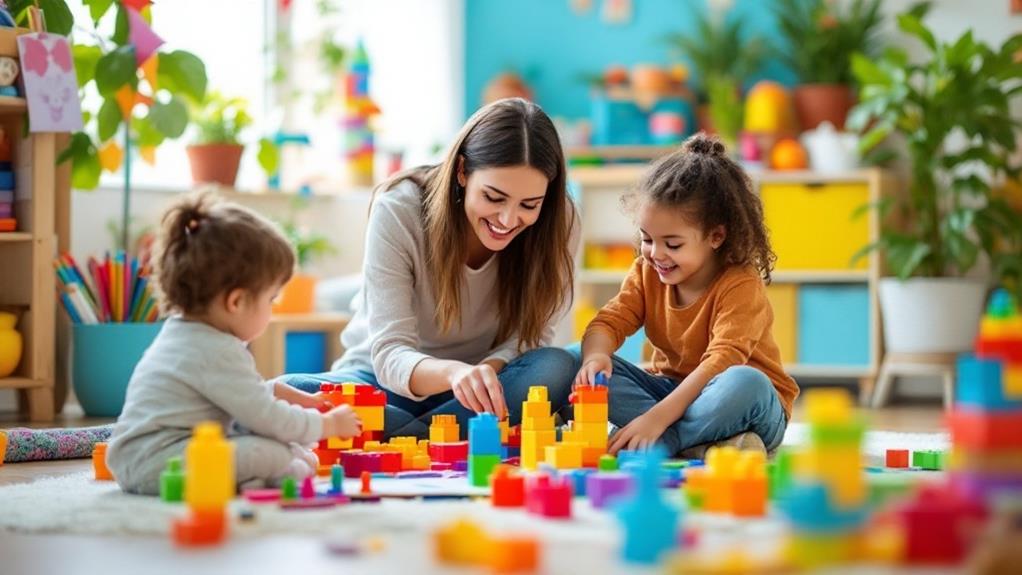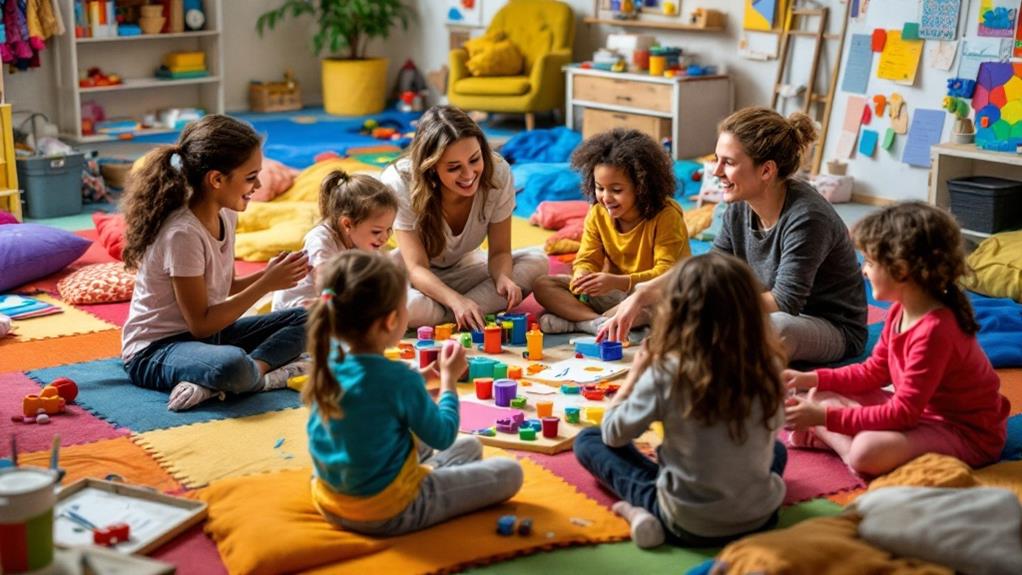In therapy, play becomes a powerful bridge to learning and growth. You might notice how therapists use play-based approaches to reveal emotions and develop essential skills. Activities like role-playing or building with blocks create safe spaces for exploration, fostering connections and trust. Through these engaging experiences, children learn to communicate, solve problems, and even embrace their vulnerabilities. By nurturing social interactions and emotional skills, therapists empower kids to thrive both personally and socially. As you explore these examples further, you may find even more inspiring insights on the transformative journey from play to progress.
Key Takeaways
- Therapists create safe environments for children to express emotions, turning play into a valuable tool for healing and development.
- Child-centered play therapy promotes self-expression, allowing children to communicate thoughts and feelings through play without adult constraints.
- Techniques like role-playing in Cognitive Behavioral Play Therapy help children develop coping strategies while enhancing emotional understanding and resilience.
- Social skills are nurtured through cooperative play, teaching children essential lessons in sharing, empathy, and conflict resolution.
- Case studies demonstrate the transformative effects of play, showcasing improvements in communication, emotional expression, and social interactions among children.
The Importance of Play in Therapy

Play holds a unique and essential place in therapy, acting as a powerful tool for healing and expression. It creates a safe space where you can explore emotions, thoughts, and experiences that might be difficult to articulate. Through play, you engage in a natural form of communication, allowing your inner world to unfold without the constraints of adult expectations.
When you immerse yourself in playful activities, you often find that barriers drop. This isn't just about fun; it's about fostering connections and building trust with your therapist. You're not just a passive participant; you're actively engaging in your healing journey. Each game or creative endeavor presents an opportunity to learn more about yourself and to confront challenges in a supportive environment.
Recognizing the importance of play in therapy encourages you to embrace your vulnerabilities and strengths alike. Whether it's through imaginative play or expressive arts, each moment spent in this therapeutic space can lead to profound insights and personal growth.
Types of Play-Based Approaches
There are several distinct play-based approaches in therapy, each tailored to meet the diverse needs of individuals. One popular method is Child-Centered Play Therapy, where you create a safe space for children to express themselves through play. It's all about letting them lead, allowing their emotions and thoughts to unfold naturally.
Another approach is Filial Therapy, which emphasizes the parent-child relationship. In this method, you train parents to engage in play with their children, strengthening bonds and improving communication. You'll see how powerful these connections can be.
Then, there's Cognitive Behavioral Play Therapy, which blends play with cognitive-behavioral techniques. You'll guide individuals to explore their thoughts and feelings through structured play, helping them develop coping strategies.
Lastly, there's Sand Tray Therapy, where you provide a sandbox filled with miniatures. Here, individuals can create scenes that reflect their inner thoughts and feelings, promoting insight and healing.
As you explore these approaches, remember that each one offers unique opportunities for growth. Your commitment to understanding these methods can make a profound difference in someone's journey toward healing and development.
Benefits for Child Development

Many children discover a world of possibilities through play-based therapy, which considerably contributes to their overall development. When you engage with them in playful activities, you're not just having fun; you're also opening doors to essential learning experiences.
This approach helps children develop crucial cognitive skills, enhancing their problem-solving abilities and creativity. As they navigate through games and activities, kids learn to think critically and explore their environment, fostering a sense of curiosity that encourages lifelong learning.
You'll also notice improvements in their physical coordination and motor skills, as play often requires movement and dexterity.
Moreover, play-based therapy nurtures social skills. Children learn to take turns, share, and communicate effectively with peers, laying the groundwork for healthy relationships in the future.
This collaborative environment instills confidence and resilience, allowing them to face challenges with a positive mindset.
Enhancing Emotional Skills
Through engaging in play-based therapy, children not only develop cognitive and physical skills but also cultivate emotional intelligence. This approach provides a safe space for children to explore their feelings, express themselves, and learn to empathize with others.
As a caregiver or therapist, you can witness the profound impact of play on emotional growth.
During sessions, children might practice emotional skills by:
- Identifying feelings: Using toys or puppets, they can express different emotions, enhancing their ability to recognize feelings in themselves and others.
- Role-playing scenarios: They can act out various situations, helping them understand different perspectives and develop empathy.
- Problem-solving: Through games that require teamwork, children learn to navigate emotional challenges, fostering resilience and patience.
Promoting Social Interaction

In the vibrant world of play-based therapy, fostering social interaction becomes a natural and joyous experience. You'll witness the magic unfold as children engage in playful activities that encourage communication, cooperation, and connection.
Through games, role-playing, and collaborative projects, therapists create a safe environment where kids can express themselves and learn the dynamics of social relationships.
As these young ones navigate play scenarios, they practice essential skills like sharing, taking turns, and resolving conflicts. It's inspiring to observe how laughter and creativity pave the way for genuine friendships to blossom.
You realize that these moments aren't just about having fun; they're building blocks for future social success.
Each interaction offers valuable lessons in empathy and understanding. By participating in shared activities, children learn to appreciate different perspectives, fostering a sense of belonging.
As you reflect on their journeys, you see the profound impact of play as a vehicle for connection and growth.
Ultimately, promoting social interaction through play-based therapy empowers children to thrive in their communities. They're not just playing; they're building the skills they need for a brighter, more connected future.
Case Studies in Action
Witnessing the transformative power of play-based therapy in real-life scenarios can be truly inspiring. You can see how therapists create a safe space where children can thrive, overcoming challenges through engaging activities that spark joy and learning.
Each case study showcases unique journeys, illuminating the profound impact of play on development.
Consider these examples:
- A shy child, once hesitant to interact, flourished during group play sessions, discovering friendships and communication skills.
- A child with sensory processing challenges found comfort in creative arts, enabling them to express emotions and connect with others.
- A young learner with autism began to grasp social cues through role-playing games, enhancing their understanding and interactions.
These case studies remind you that play isn't just fun; it's a powerful tool for growth.
As you reflect on these stories, you're encouraged to embrace the potential of play-based therapy in your own practice.
Every interaction can lead to breakthroughs, fostering resilience and empowerment.
With empathy and creativity, you can help others navigate their paths, transforming lives one playful moment at a time.
Conclusion
In therapy, play is like a bridge connecting fun to growth, helping children thrive in ways that traditional methods often can't. By embracing play-based approaches, you're not just fostering skills but also nurturing joy and creativity. Each laughter-filled moment becomes a stepping stone, guiding kids through challenges and building their self-esteem. As you watch them flourish, remember that every game and giggle is a powerful tool for transformation, paving the way for a brighter future.
